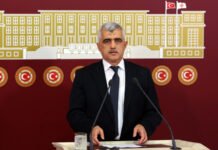Former Peoples’ Democratic Party (HDP) deputy Aysel Tuğluk has been denied access to proper healthcare in prison, her lawyers said in a written statement on Sunday, Turkish media reported.
“We would like to inform the public that ever since Tuğluk fell ill in prison, we [her lawyers] have demanded proper medical treatment and her release,” Reyhan Yalçındağ and Serdar Çelebi said. “The HDP and the Human Rights Association have also petitioned for her release.”
Tuğluk’s lawyers pointed out that the health problems of sick political prisoners were ignored until it was too late for them to be treated.
They did not disclose Tuğluk’s illness, saying she wanted it to remain private, but said the Institute of Forensic Medicine had conducted a physical examination and that they were waiting for a report determining whether she was fit to remain in prison.
“The institute has a responsibility to issue the report as soon as possible, without a further delay that can impact Tuğluk’s condition,” the lawyers said.
Tuğluk was arrested on December 29, 2016 while she was co-chair of the HDP along with seven other Kurdish opposition politicians. She was sentenced to 10 years in prison on charges of serving as the executive of a terrorist organization and taking orders from Abdullah Öcalan, the jailed leader of the outlawed Kurdistan Workers’ Party (PKK).
The PKK is an armed secessionist group listed as a terrorist organization by Turkey, the European Union and the US.
Several public speeches she made and her attendance at funerals of alleged terrorists were used as evidence against her in court.
Tuğluk has denied the accusations, saying she never called for violence and always sought democratic solutions to problems the Kurds faced. She added that she was only a member of the HDP and the Democratic Society Congress (DTK), an umbrella organization that aims to bring together pro-Kurdish political parties, and NGOs. However, Turkish authorities have argued that the DTK has links to the PKK.
Human rights activists and opposition politicians have frequently criticized authorities for not releasing critically ill prisoners so they can seek proper treatment. Human rights defender and Peoples’ Democratic Party (HDP) deputy Ömer Faruk Gergerlioğlu said ill prisoners were not released until they were at the point of no return.
According to Gergerlioğlu, sick prisoners are released when the authorities realize they will die soon. He claimed that prisoners did not have access to proper healthcare facilities such as hospitals or infirmaries.
HPD deputy Züleyha Gülüm said political prisoners were the most disadvantaged and were often the least likely to be released in the event of a serious health problem.
Since April 2020 four seriously ill prisoners over the age of 70 have died in penal institutions; five inmates suffering from cancer passed away shortly after they were released; and 16 died of chronic illnesses while imprisoned.
















